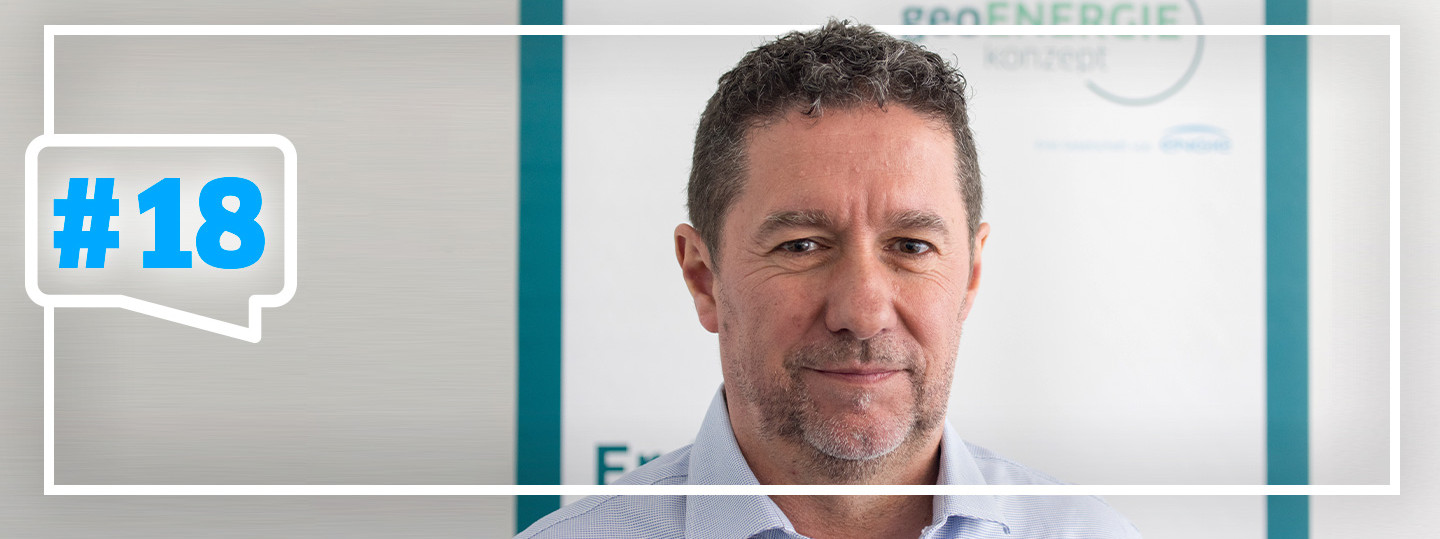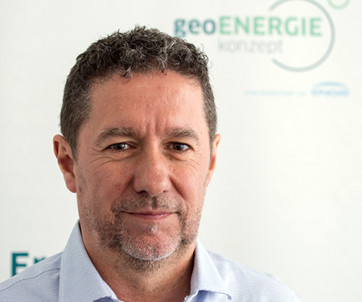
Impulses #18: Geothermal energy - the treasure from the depths
The energy crisis is giving renewable energies the long-awaited boost. But, wait: really all the corresponding energy sources? Rüdiger Grimm, managing director of geoENERGIE Konzept, thinks it's high time to finally recognize the potential of geothermal energy, too, and make much more use of it. He takes the reins from Manfred Schmitz, CEO of ENGIE Deutschland, in today's "Zero Carbon" editorial and explains why geothermal energy can be a gamechanger for the heat transition.
Geothermal energy - a great treasure or a considerable risk? Hardly any other topic in the field of renewable energies is so hotly disputed by the public. My experience shows that geothermal plants are unfortunately preceded by many prejudices. I greatly regret this and have been committed for many years to countering such misgivings with facts. I would like to clear up one misconception right at the beginning: geothermal energy is not just geothermal energy. It is important to distinguish between "shallow geothermal energy" - i.e. the use of geothermal energy at depths of up to 400 meters - and "deep geothermal energy" - everything below that. The two are often mixed up, although they do not have much in common. We at geoENERGIE Konzept, a subsidiary of Storengy Deutschland, deal exclusively with shallow geothermal energy. This type of geothermal energy utilization does not require fracking or deep drilling. As a result, it can be used in both the commercial and residential sectors and is ideal for heating buildings. In other words, geothermal energy from the earth can make a decisive contribution to driving forward the heat revolution - and thus solving a good part of our energy worries. It is climate-friendly, it is available all year round and almost everywhere, and it is inexhaustible by human standards. It also makes us independent of energy imports. Nevertheless, geothermal energy has so far eked out a shadowy existence, at least in Germany. So it's high time to focus more on geothermal energy!
"We need to rethink geothermal energy. If we can do that, it will be a huge treasure on the road to decarbonization and achieving the heat transition."
Rethinking Geothermal
The fact that the importance of geothermal energy is currently changing was recently demonstrated by the European Geothermal Energy Congress (EGC 2022) in Berlin. Organized by the European Geothermal Energy Council (EGEC) and the German Geothermal Energy Association (BVG), of which I have been a board member for the past four years, the most important industry event in Europe enjoyed an enormous turnout: Originally expected to attract around 700 participants, we welcomed more than 1,200 guests on site. The interest was enormous, the presentations and discussions intensive. I was particularly pleased that our presentation became a magnet for visitors. Together with ENGIE France from the field of deep geothermal energy with an international focus, geoENERGIE Konzept and Storengy from the field of near-surface geothermal energy and with a national focus had a joint stand. The absolute highlight was our completely sold-out excursion to various construction sites in Berlin, including an energy pile construction site on a gigantic scale rarely seen in Germany. This was a special experience for me and a clear sign that the perception and role of geothermal energy is slowly changing. And that makes perfect sense in light of the energy crisis and climate change. Geothermal energy needs to move out of the niche and into the mainstream.
Geothermal energy as an innovative energy technology
What does federal policy actually say about geothermal energy? In fact, very little in concrete terms. But it has already said a great deal about decarbonization and climate protection targets that are as essential as they are highly ambitious. The coalition agreement sends a clear signal in the direction of renewable heating technologies, namely the 65 percent target for renewable energies from 2024. Because without heat pumps, the CO2 targets will be almost impossible to achieve - for example, with ground-coupled heat pumps that use geothermal energy as a heat source instead of air via geothermal probes or collectors. This immediately brings to mind another prejudice: heat pumps work wonderfully well in new buildings, but not in renovation projects, according to the conventional wisdom. This is not correct. The technology can very well be worthwhile in old buildings, too. For example, because it is ultimately cheaper than gas and more efficient than electricity. I think the efficiency aspect is underestimated. Too little attention is paid to it, because electricity will always be available in sufficient quantities. However, electricity has a fossil footprint. In our electricity mix, 60 percent currently comes from fossil fuels. In ten years, it is expected to be 40 percent, and the electricity mix will become increasingly green. Even today, in the "worst case scenario," it is made up of about one-fourth fossil-generated electricity and three-fourths renewables. And with greener electricity, geothermal energy is also becoming greener without having to do anything for it. By the way, on the subject of new buildings: Thanks to their insulated shells, modern low-energy houses hardly need any heat supply. But they do need cooling. Near-surface geothermal energy can also use the earth's heat to provide air-conditioning. This option is very interesting for commercial properties, such as data centers. In addition, geothermal energy is an ideal energy storage medium. Geothermal energy can be reliably stored - and for a long time. Long story short: Thanks to their many advantages, geothermal plants could become the all-round talents of the future.
Why geothermal energy is an all-round talent
Perhaps you are now asking yourself why geothermal energy is not already much more widespread? From my point of view, this is mainly due to three aspects. First, geothermal energy - as I have already described - still has a bad reputation. Many citizens have reservations when corresponding projects are planned in their region. In my opinion, this fear is unfounded. The fact is that there have been no geothermal wells in Germany or Europe that have resulted in personal injury. The advantages that geothermal energy offers us as a renewable energy source clearly outweigh the disadvantages. Second, the regulatory requirements in Germany are very complex - similar to those for photovoltaics and wind energy. They are found in mining law and water law, which varies from state to state. This makes the processes complicated and costly. It is undisputed that groundwater protection is important. However, if done properly, this does not conflict with renewable energies in any way. I therefore believe that it is essential to adapt water law to the pressure of the energy transition. Requirements and permits must become much simpler. A good way to achieve this is a traffic light card system, as is currently being developed in the "WärmeGut" research project led by the Leibniz Institute for Applied Geophysics (LIAG). The goal is to create a uniform nationwide geothermal potential map that would provide a solid basis for decision-making and could enormously accelerate the rollout of geothermal plants. The project is being funded by the German Federal Ministry of Economics and Climate Protection and is expected to produce results in three years. And regarding the so-called mining law: According to the current legal situation, the heat in the ground belongs to the person who owns the property. As you can imagine, this can quickly become complicated for neighbors and must be well planned in practice. Here it is worthwhile to take a look across the borders: For example, there are extensive ground energy plans in the Netherlands, and Sweden is also considered a pioneer. Speaking of other countries: Interestingly, geothermal energy and heat pumps are currently being massively pushed in the USA as part of the "Inflation Reduction Act of 2022". I expect this development to spill over to us. This will boost geothermal systems in this country.
With geothermal energy into climate neutrality
I still owe you one aspect: the low drilling capacity. For me, it represents the narrowest bottleneck to advancing the supply of heat with geothermal energy on a large scale. We need more personnel, a lot more personnel. The drilling companies we have in Germany today will not be able to handle the growing demand. Even today, the demand for drilling capacity is significantly greater than the supply. That's why, on the one hand, foreign companies must be allowed onto the German market that are certified and thus meet the highest standards for well work and drilling. Secondly, we need uniform training standards for well drillers so that we can meet our demand for specialists from abroad. Corresponding initiatives already exist; however, such processes take time. Time that we do not have in view of the steep energy prices and climate change. That's why my thesis is that German geothermal projects in the new year 2023 will focus on large-scale commercial projects. In the private sector, our home builders will probably rely on air-source heat pumps instead of ground-source heat pumps in the future - increasingly from Asia. This situation will only change once the regulatory and political conditions have changed. Then we will be able to fully exploit the potential of geothermal energy as a natural, non-fossil, renewable energy source.
How do you assess the current situation? Is geothermal energy a great treasure for you as well - and do you have further ideas on how we can force the way from the niche to the mass market? I would be pleased if you wrote to me about this!
Sincerely
Rüdiger Grimm
Managing Director geoENERGIE Konzept
Our Expert











